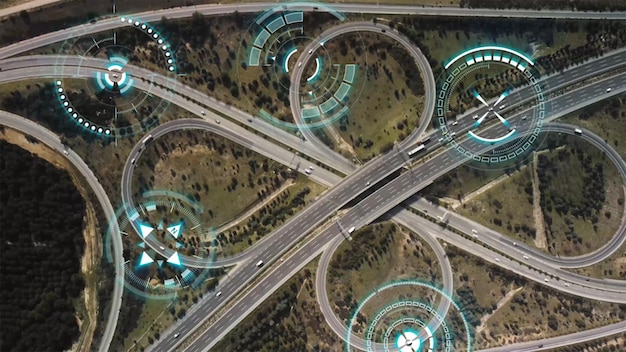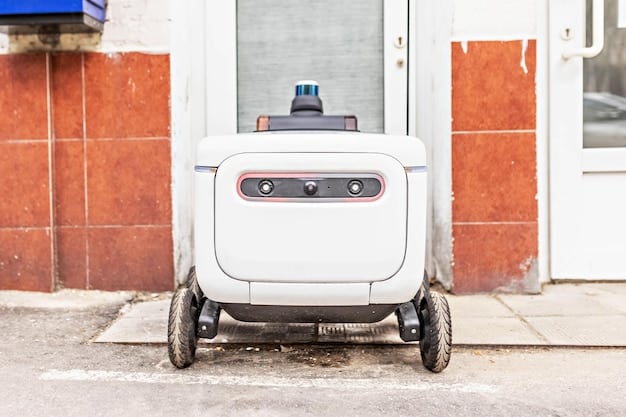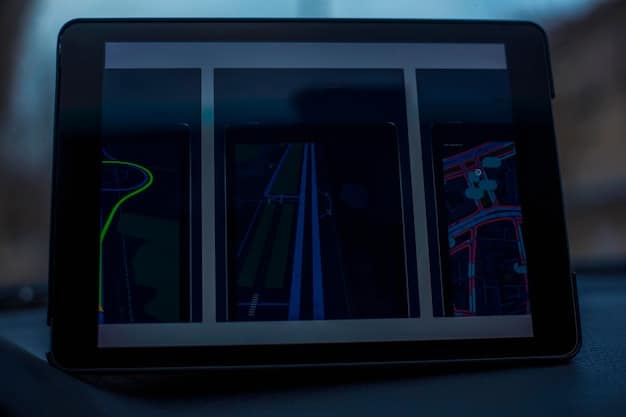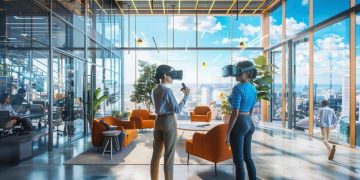US Mobility Startups: Autonomous Vehicles & Smart Transport Solutions

Startup Spotlights explores innovative US startups revolutionizing transportation with autonomous vehicles and smart solutions, paving the way for a safer, more efficient, and sustainable future of mobility.
The future of transportation is rapidly evolving, driven by innovative startups developing cutting-edge autonomous vehicles and smart transportation solutions. In this Startup Spotlight: The Future of Mobility: US Startups Developing Autonomous Vehicles and Smart Transportation Solutions, we delve into the exciting world of US startups that are transforming how we move people and goods.
The Rise of Autonomous Vehicles in the US
Autonomous vehicles (AVs) are no longer a futuristic fantasy; they are quickly becoming a reality on US roads. Several startups are leading the charge in developing and deploying AV technology, aiming to improve safety, efficiency, and accessibility in transportation.
These startups are tackling various aspects of AV development, from sensor technology and artificial intelligence to software platforms and vehicle design. Their innovations are paving the way for a future where self-driving cars, trucks, and buses are commonplace.
Key Players in the AV Startup Space
Several US startups are making significant strides in the autonomous vehicle sector, each with unique approaches and technologies.
- Nuro: Focused on last-mile delivery using small, driverless vehicles designed for local commerce.
- Aurora: Developing a full-stack self-driving system applicable to various vehicle types, from passenger cars to long-haul trucks.
- Cruise: Working to deploy a fleet of electric, self-driving vehicles for ride-hailing services in urban environments.
These startups are attracting significant investment and partnerships, indicating the growing confidence in the potential of autonomous vehicle technology.

The development of autonomous vehicles in the US is not without its challenges. Regulatory hurdles, public perception, and technological advancements all play a crucial role in shaping the future of AV deployment. However, the potential benefits of AVs, such as reduced accidents, increased mobility for the elderly and disabled, and improved traffic flow, are driving innovation and investment in this field.
Smart Transportation Solutions: Beyond Autonomous Vehicles
While autonomous vehicles dominate the headlines, smart transportation solutions encompass a broader range of technologies and approaches aimed at improving mobility. US startups are developing innovative solutions for everything from urban planning to public transportation.
These solutions leverage data analytics, artificial intelligence, and connectivity to optimize traffic flow, reduce congestion, and enhance the overall transportation experience.
Innovations in Urban Mobility
US startups are developing groundbreaking solutions to address the challenges of urban mobility, such as congestion, pollution, and limited accessibility.
- Transit: A mobile app providing real-time information on public transportation options, enabling users to plan their journeys more efficiently.
- Lime: Offering a network of shared electric scooters and bikes, providing a convenient and eco-friendly alternative for short-distance travel.
- Coord: Providing a platform for cities and transportation providers to manage and optimize shared mobility services.
These startups are working to create a more sustainable and efficient urban transportation ecosystem by leveraging technology to improve existing infrastructure and introduce new mobility options.
Smart transportation solutions are not just about technology; they also involve rethinking urban planning and infrastructure design. Startups are collaborating with cities to develop innovative solutions that prioritize pedestrian and cyclist safety, promote public transportation, and reduce reliance on private vehicles.

The Role of AI and Data Analytics
Artificial intelligence (AI) and data analytics are playing a crucial role in the development of both autonomous vehicles and smart transportation solutions. US startups are leveraging these technologies to improve the performance, safety, and efficiency of transportation systems.
AI algorithms are used to process sensor data, make driving decisions, and optimize traffic flow. Data analytics provides insights into travel patterns, demand fluctuations, and areas for improvement in transportation infrastructure.
Applications of AI in Mobility
AI is transforming various aspects of the transportation industry, from autonomous driving to predictive maintenance.
- Autonomous Driving: AI algorithms are used to interpret sensor data, navigate roads, and avoid obstacles.
- Traffic Management: AI can optimize traffic flow by adjusting traffic signal timings and rerouting vehicles based on real-time conditions.
- Predictive Maintenance: AI can analyze vehicle data to predict potential maintenance issues and prevent breakdowns.
The use of AI and data analytics in transportation is enabling safer, more efficient, and more sustainable mobility solutions.
Data privacy and security are crucial considerations in the use of AI and data analytics in transportation. Startups are implementing robust measures to protect user data and ensure the responsible use of AI technologies.
Challenges and Opportunities
The development and deployment of autonomous vehicles and smart transportation solutions face several challenges and opportunities. US startups must navigate regulatory hurdles, address public perception concerns, and adapt to technological advancements.
However, the potential benefits of these technologies, such as reduced accidents, improved accessibility, and increased efficiency, are driving innovation and investment in the field.
Key Challenges Facing Mobility Startups
Several obstacles stand in the way of widespread adoption of autonomous vehicles and smart transportation solutions.
- Regulatory Uncertainty: The lack of consistent regulations across different states and municipalities is hindering the deployment of AV technology.
- Public Perception: Public skepticism about the safety and reliability of AVs needs to be addressed through education and transparency.
- Technological Limitations: AV technology still faces challenges in handling complex driving scenarios and adverse weather conditions.
Overcoming these challenges will require collaboration between startups, governments, and the public.
Despite the challenges, the opportunities for mobility startups are vast. The growing demand for sustainable transportation, the increasing urbanization of populations, and the rapid advancements in technology are creating a favorable environment for innovation in the mobility sector.
The Economic Impact of Mobility Innovations
The innovations in autonomous vehicles and smart transportation solutions are poised to have a significant economic impact. US startups are creating new jobs, attracting investment, and transforming industries.
The development and deployment of these technologies are creating opportunities in fields such as software engineering, data science, and urban planning.
Economic Benefits of Smart Mobility
The adoption of autonomous vehicles and smart transportation solutions can lead to various economic benefits.
- Job Creation: The development and deployment of AV technology are creating new jobs in software engineering, data science, and related fields.
- Increased Productivity: Autonomous vehicles can improve productivity by allowing drivers to work or relax during their commute.
- Reduced Congestion: Smart transportation solutions can reduce traffic congestion, leading to time savings and fuel efficiency.
The economic impact of mobility innovations extends beyond the transportation sector, affecting industries such as logistics, retail, and tourism.
Governments are playing a crucial role in fostering innovation in the mobility sector by providing funding, establishing regulatory frameworks, and supporting research and development initiatives.
Future Trends in Mobility
The future of mobility is likely to be shaped by several key trends, including the increasing adoption of electric vehicles, the integration of multimodal transportation systems, and the rise of Mobility-as-a-Service (MaaS) platforms.
US startups are at the forefront of these trends, developing innovative solutions that are transforming the way we move people and goods.
Emerging Trends in Transportation
Several trends are shaping the future of the mobility landscape.
- Electric Vehicles: The increasing adoption of electric vehicles is driving demand for charging infrastructure and battery technology.
- Multimodal Transportation: The integration of different modes of transportation, such as public transit, ride-sharing, and micro-mobility, is creating seamless travel experiences.
- Mobility-as-a-Service: MaaS platforms are providing users with access to a range of transportation options through a single interface.
These trends are converging to create a more sustainable, efficient, and user-friendly transportation ecosystem.
Collaboration between startups, established companies, and governments is essential to realize the full potential of these emerging trends.
| Key Point | Brief Description |
|---|---|
| 🚗 Autonomous Vehicles | US startups are pioneering self-driving technology for safer and more efficient transportation. |
| 🏙️ Smart Urban Mobility | Solutions addressing congestion, pollution, and accessibility in cities. |
| 🤖 AI & Data Analytics | Improving transportation systems’ safety, efficiency, and performance. |
| ⚡ Economic Impact | Mobility innovations creating jobs, attracting investment, and transforming industries. |
FAQ
▼
Autonomous vehicles are vehicles capable of sensing their environment and operating without human input. They use sensors, AI and machine learning to navigate roads and avoid obstacles, offering potential for safer and more efficient transportation.
▼
Smart transportation solutions use data analytics, AI, and connectivity to optimize traffic flow, reduce congestion, and enhance the overall transportation experience. They range from real-time public transit information to shared mobility services.
▼
AI is crucial for autonomous driving, traffic management, and predictive maintenance. AI algorithms interpret sensor data, optimize traffic flow, and predict vehicle maintenance needs, leading to safer and more efficient transportation.
▼
Mobility startups face regulatory uncertainty, public perception challenges, and technological limitations. Overcoming these requires collaboration between startups, governments, and the public to address concerns and advance technology.
▼
Mobility-as-a-Service (MaaS) platforms provide users with access to a range of transportation options (e.g., public transit, ride-sharing, micro-mobility) through a single interface, promoting seamless and integrated travel experiences.
Conclusion
US startups are at the forefront of the mobility revolution, developing innovative autonomous vehicles and smart transportation solutions that have the potential to transform the way we move people and goods. By addressing challenges, embracing opportunities, and collaborating with stakeholders, these startups can pave the way for a safer, more efficient, and sustainable future of mobility.





